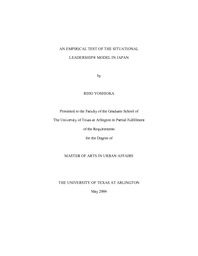
ATTENTION: The works hosted here are being migrated to a new repository that will consolidate resources, improve discoverability, and better show UTA's research impact on the global community. We will update authors as the migration progresses. Please see MavMatrix for more information.
Show simple item record
| dc.contributor.author | Yoshioka, Riho | en_US |
| dc.date.accessioned | 2007-08-23T01:56:44Z | |
| dc.date.available | 2007-08-23T01:56:44Z | |
| dc.date.issued | 2007-08-23T01:56:44Z | |
| dc.date.submitted | May 2006 | en_US |
| dc.identifier.other | DISS-1317 | en_US |
| dc.identifier.uri | http://hdl.handle.net/10106/437 | |
| dc.description.abstract | Since the collapse of the "bubble economy" in the early 1990s, Japanese companies have been struggling with financial difficulty, and have been forced to change their structure, strategies, and management systems. The trend of learning and importing successful American management theories and systems expanded to Japanese society. The Situational Leadership® model, developed by Hersey and Blanchard, is an example of this phenomenon. However, many cross-cultural studies propose that Japanese society has a different culture and values from American society. Therefore, by focusing on Situational Leadership®, this study examined whether models developed in the United States are suitable for Japanese companies. The results partially support the basic principles of the model. However, findings indicated that the Japanese have a preference for stronger relationships between leaders and members than American workers. These findings suggest that it is necessary to interpret the principles of management differently when Japanese companies use American management models. | en_US |
| dc.description.sponsorship | Guignard, Rose-May | en_US |
| dc.language.iso | EN | en_US |
| dc.publisher | Urban & Public Affairs | en_US |
| dc.title | An Empirical Test Of The Situational Leadership® Model In Japan | en_US |
| dc.type | M.A. | en_US |
| dc.contributor.committeeChair | Guignard, Rose-May | en_US |
| dc.degree.department | Urban & Public Affairs | en_US |
| dc.degree.discipline | Urban & Public Affairs | en_US |
| dc.degree.grantor | University of Texas at Arlington | en_US |
| dc.degree.level | masters | en_US |
| dc.degree.name | M.A. | en_US |
Files in this item
- Name:
- umi-uta-1317.pdf
- Size:
- 941.4Kb
- Format:
- PDF
This item appears in the following Collection(s)
Show simple item record


